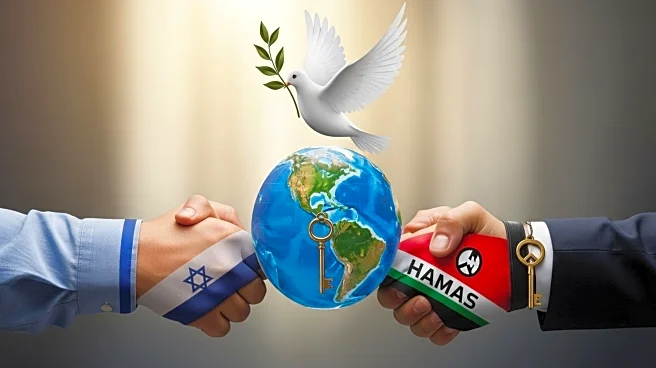What's Happening?
President Trump has urged Israeli Prime Minister Benjamin Netanyahu and the militant group Hamas to accept a peace plan aimed at resolving the ongoing conflict in Gaza. The plan, proposed by President Trump, seeks to establish a ceasefire and facilitate the release of hostages currently held in Gaza. Israeli protesters have been gathering weekly near the prime minister's residence in Jerusalem, expressing hope that the plan will lead to a resolution. Some protesters believe that President Trump's impatience may push Netanyahu to adhere to the plan, potentially ending the war and securing the hostages' release.
Why It's Important?
The acceptance of President Trump's peace plan could significantly impact the geopolitical landscape in the Middle East. A ceasefire and the release of hostages would not only alleviate tensions between Israel and Hamas but also potentially stabilize the region. For Netanyahu, adhering to the plan could enhance his legacy, as some protesters suggest it is his opportunity to be remembered positively. The situation also underscores the influence of U.S. foreign policy in international conflicts, with President Trump's involvement being a critical factor in the potential resolution of the crisis.
What's Next?
If Netanyahu and Hamas agree to the peace plan, the next steps would likely involve negotiations to implement the ceasefire and arrange the hostages' release. The international community, including the United States, may play a role in facilitating these discussions. The outcome could lead to broader diplomatic engagements aimed at long-term peace in the region. Stakeholders, including political leaders and civil society groups, will be closely monitoring the developments, as the resolution of this conflict could set a precedent for future peace efforts in the Middle East.
Beyond the Headlines
The situation highlights the ethical and humanitarian dimensions of international diplomacy, particularly concerning the treatment of hostages and civilians in conflict zones. The pressure on Netanyahu to act may reflect broader societal expectations for leaders to prioritize human rights and peace over political maneuvering. Additionally, the involvement of President Trump in the peace process illustrates the complex interplay between domestic politics and international relations, as U.S. leaders often face scrutiny over their foreign policy decisions.









